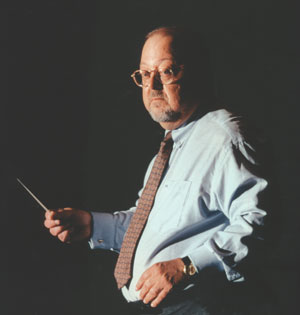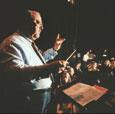 Over the past 46 years as a band director I have directed bands from the elementary school to the university level. Occasionally I was asked if I looked forward to moving up, but this always seemed to be a silly question. Each of these positions was equally difficult. In my view some directors worry too much about being at the top of the profession.
Over the past 46 years as a band director I have directed bands from the elementary school to the university level. Occasionally I was asked if I looked forward to moving up, but this always seemed to be a silly question. Each of these positions was equally difficult. In my view some directors worry too much about being at the top of the profession.
At first I thought I knew everything, but working with a veteran director, Wayne Becker, it became obvious how much I had to learn. Together we covered four elementary schools in a district with a boatload of students.
One of my strongest memories from these early years is the necessity of trying anything that might help students. We often experimented with new approaches and materials and even made a big chart that compared the characteristics of different method books. The chart noted when clarinets played over the break or when each book introduced eighth notes. When another publisher released a new method that might be better, we tried it with one of the elementary bands as a trial run and sometimes used it at all schools in the district.
In the 1960s there were some clarinet mouthpieces that cost only $4 and worked almost as well as the expensive models made in France. Wayne and I measured all of the available mouthpieces and recommended to students the best of the inexpensive ones, which were nearly identical to the pricier models.
We also spent time helping each other learn the fine points of different instruments. Wayne was stronger with brass instruments and I played clarinet, saxophone, and flute professionally, so we worked on our weaker instruments. During our first year together he worked on flute after school and I practiced tuba. The next year he moved on to clarinet while I learned the trombone. Some of my dedication to hard work resulted from early hurdles when I was a young player. I clearly recall that as a 4th grader I felt really discouraged after playing a solo, and I vowed never to play that badly again. That realization and commitment to music changed my life.
I learned from experience that students blossom at different speeds, and there is no benefit to rushing through a lesson book. It is more important to learn basic concepts and move forward slowly than to cover a large amount of material quickly.
We also had a problem with tubas and school buses; the bus drivers would not allow tubas. We decided to buy every used, small tuba we could find and have one at each student’s home. It was a costly plan, but we got the word out to the musicians’ union and every music store and school. We managed to get one for $100 from a union member and four more from a local music store owner.
During the seven years Wayne and I worked together he received two unsolicited invitations to take his 7th and 8th grade band to the Midwest Clinic. He declined both and said, “I don’t think it is the right thing to do with these students because I would have to keep them on the same literature for way too long. I don’t think that’s good music education.”
We tried creative ways to measure pitch retention, rhythm retention, and the ability to match rhythms and pitches in new students. We gave these tests to all 4th graders, and the results helped in guiding instrument choices. Another help was a local dentist, who made recommendations about common dental problems related to certain instruments.
In 1968 I moved on to Kettle Moraine High School and discovered that the previous director had left behind a blizzard of forms and rules. I threw all of the forms into the trash and simply told students that they would get as much out of the horn as they put into it. As Louis Armstrong once said, “The horn doesn’t lie.” I used what I learned from working with Wayne and gave lessons to all 40 students, and gradually they realized that I would be fair with them. Before long the band grew to 80 and had a good instrumentation. I believe this is the way to take over a program as a new director: evaluate what has been done, keep it simple, and get to work.
Initially, only a few students in the band could play with any skill. When I arrived the superintendent told me that my first job was to get the band to play the Star Spangled Banner without stopping because the parents had been complaining. I agreed and asked what support I could expect from him. He pulled his checkbook out, put it on the table, and declared, “I want the best high school band in the state.” I got to work, and he kept his word. As the numbers grew, so did the staff. The band program at the high school grew to two directors and three bands with an enrollment of 250 students out of a school population of 900. The middle school program grew to a band every hour of the day, and one director was added to teach the fifth grades in four elementary schools.
The solo and ensemble contest became an important method for building enthusiam. I explained that I wanted every student to participate and wouldn’t care if they earned a 5 or a 1. So long as they finished the project, everyone was a winner. Whenever a student or ensemble qualified for the state contest, I put an 8×10 glossy picture of them on the wall. Because everyone wanted to be featured on that wall, it became a motivator for hard work. Some athletes even quit sports to be in the band, and the football coach commented that my trumpet section was bigger than his offensive line. I smiled and replied, “I have a better product.” I had the entire state champion cross country team and two state champion wrestlers in the band.
We supported the athletic teams by playing in the stands for games and performing on the field for homecoming. I put together the first marching band in the history of Kettle Moraine High School but tried to keep our performances memorable by limiting the number of appearances we made. At times the superintendent asked us to take the field for more games, but I gently refused. The band always sounded good and became so popular that people went to get refreshments during the game in order to be there when the band played. I believe that if the band took the field every week it would have diluted our appeal.
Through my 15 years at Kettle Moraine High School I continued to discover new ideas to improve my teaching. Once we worked on an arrangement of the William Tell Overture that gave the violin part to the clarinets, and I showed the part to the principal clarinetist of the Milwaukee Symphony. He agreed that the part was too difficult for high school players. I examined another arrangement of this work and discovered that it gave this tricky part to the flutes. I decided to simplify the clarinet part and gave the harder line to the flutes, which made a big difference because the flutes could double tongue the part.
Over the years my interest in composing and arranging sparked students to explore this field. In my last two years at Kettle Moraine there were 15 students who wanted to study composition, so we organized an independent study class that met daily. We talked about scales, theory, and conducting, and the final project was to write an original piece using three chords and fully orchestrated for the band.
Students had the opportunity to present their works at the final concert of the year, called “Composer’s Symposium.” The concert began with the front row of clarinets playing Mozart’s clarinet concerto in unison.
The effect was impressive. I explained to the audience that when Mozart first gave the premiere of the piece, he could not have imagined that the music would become a standard throughout the world. I then noted that the evening’s concert would also include original pieces. I then invited each of the students to discuss their pieces, take the baton, and conduct the world premiere. The pride these students demonstrated as they took the podium to conduct gave me goosebumps as I watched from the front row.
In 1983 I accepted the position of director of bands and music programs at Marquette University, but I never thought of that or any other career change as a move up or down. Each change was a lateral move. I have learned that the secret of success is to teach every level of students with as much creativity and dedication as I can. The greatest teachers succeed solely because of the players they teach and develop. No one can succeed with a room full of empty chairs, and I firmly believe that directors have to spark the enthusiasm of students as well as develop their conducting technique.






